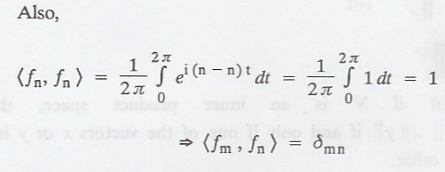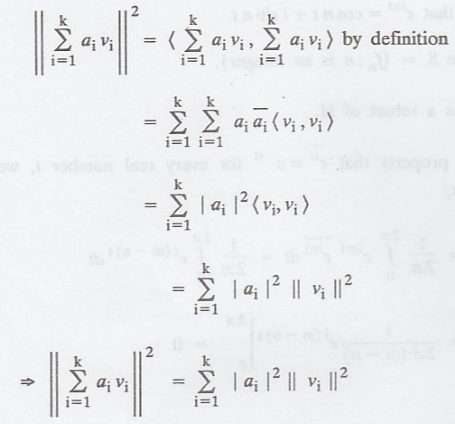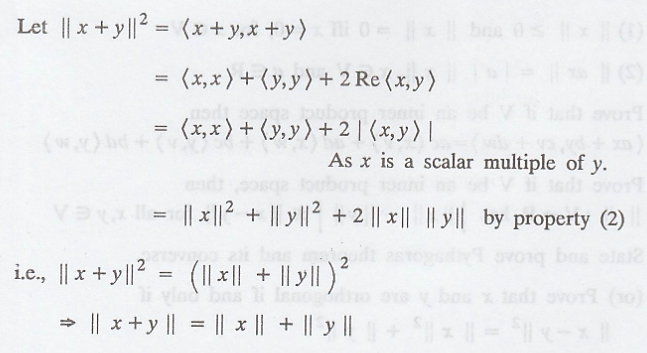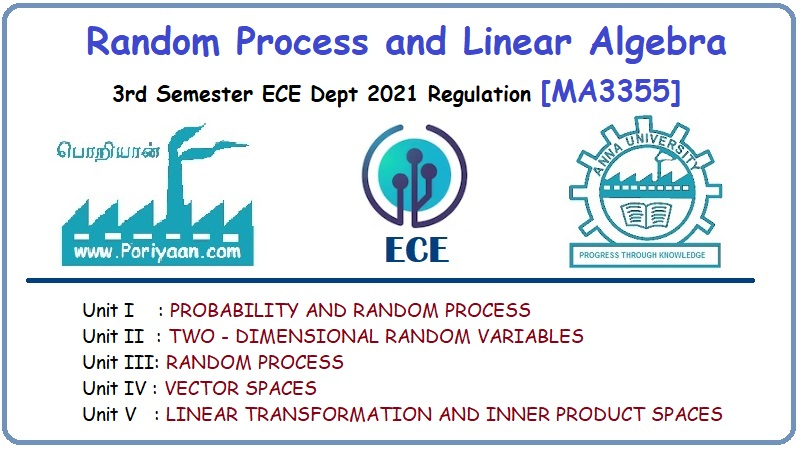Random Process and Linear Algebra: Unit V: Linear Transformation and Inner Product Spaces,,
Vectors x and y in V are orthogonal(perpendicular)
Discuss about two vectors are orthogonal (perpendicular)
(e)
Vectors x and y in V are orthogonal (perpendicular)
Definition 1:
Let V be an inner
product space. Vectors x and y in V are orthogonal (perpendicular) if <x,y> = 0
Definition 2:
A subset S of V is
orthogonal if any two distinct vectors in S are orthogonal.
Definition 3:
A vector x in V is a
unit vector if ||x|| = 1.
Definition 4:
A subset S of V is
orthgonormal if S is orthogonal and consists entirely of unit vectors.
Note :
1. If S = {v1,
v2, ...}, then S is orthonormal if and only if (vi, vj)
= δij, where δij denotes the Kronecker delta.
2. Multiplying vectors
by non-zero scalars does not affect their orthogonality and that if x is any
non-zero vector, then (1/||x||)x is a unit vector.
The process of
multiplying a non-zero vector by the reciprocal of its length is called
normalizing.
Example
If F3, {(1,
1, 0), (1, −1, 1), (−1, 1, 2)} is an orthogonal set of non-zero vectors, but it
is not orthonormal; however, if we normalize the vectors in the set, we obtain
the orthonormal set

Example
Recall the inner
product space H. We introduce an important orthonormal subset S of H.
i is the imaginary
number such that i2 = -1.
For any integer n, let
fn(t) = ei n t, where 0 ≤ t ≤ 2л.


Problem 1.

Solution
:


Problem 2.
Prove that if V is an
inner product space, then |<x,y>| = ||x|| . ||y|| if and only if one of
the vectors x or y is a multiple of the other.
Solution
:
Let V be an inner
product space.
To prove |<x,y>|
= ||x|| . ||y|| if and only if one of the vectors x or y is a multiple of the
other.
The result is trivial
if y = 0, as y is a scalar multiple of x and there is the equality.
Now, assume that y ≠ 0,
and then for a Є R


The above expression is
equivalent to <x,y> ≤ ||x|| . ||y||
Observe that in the
above inequality the equality holds only in the case that || x - ay || = 0 and
hence, x = ay that is x is a scalar multiple of y.
Problem 3.
If V is an inner
product space then derive ||x + y|| = ||x|| + ||y|| and generalise if to the
case of n vectors.
Solution
:

Again, generalize the
above result to the case of n vectors.

EXERCISE 5.3
1. Prove that if V be
an inner product space, the norm function 

2. Prove that if V be
an inner product space then

3. Prove that if V be
an inner product space, then 
4. State and prove
Pythagoras theorem and its converse.
(or) Prove that x and y
are orthogonal if and only if ||x − y||2 = ||x||2 + ||y||2
5. Prove that ||x|| =
||y|| if and only if 
6. 
7. Show that [u1,
u2, u3] is an orthogonal set

8. Prove that v / ||v||
is always a unit vector.
9. If the vectors u1
= (1, 2i, i), u2 = (0, 1 + i, 1), u3 = (2, 1-i, i) Є C3,
then find (i) ||u1|| (ii) ||u2|| (iii) ||u3||
Random Process and Linear Algebra: Unit V: Linear Transformation and Inner Product Spaces,, : Tag: : - Vectors x and y in V are orthogonal(perpendicular)
Related Topics
Related Subjects
Random Process and Linear Algebra
MA3355 - M3 - 3rd Semester - ECE Dept - 2021 Regulation | 3rd Semester ECE Dept 2021 Regulation
